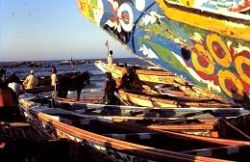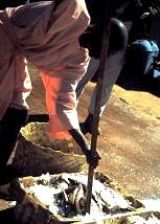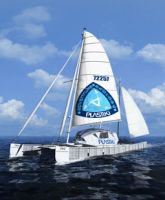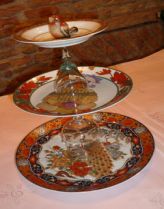The sea stewards of Kayar
Senegalese fishing community polices itself
 60.000 small fishermen in their piroques, hundreds of big sea going trawlers from African countrie, Russia, Europe and Japan. Who shall save the once abundant fish along the African Westcoast?
60.000 small fishermen in their piroques, hundreds of big sea going trawlers from African countrie, Russia, Europe and Japan. Who shall save the once abundant fish along the African Westcoast?
The Senegalese fishing community has taken the lead in its country, setting an example of a more sustainable practice from its beaches. Alarmed by the crazy decline of ‘their’ fish stocks the local families got together and with the help of international and Senegalese NGO’s they installed a revolutionary and rigorous system of self control.
Waiting…
Before the eighties, some 200 fishing boats plied their small scale trade from the town’s white beaches, jockeying the surf just a few miles out to sea. But then the dramatic Sahel inland draughts caused an invasion of bereft families seeking protein in the water where land no longer offered food.
Now the beaches are crammed with colorful boats going in and out, the people pushing or pulling them with a lot of shouting and laughing, while women and children sit in the sand, cooking their supper, trading catches or playing soccer. And everyone is waiting who will return from the treacherous ocean and who won’t. And who may have caught a few meager fish.
More with less
“Fish got less and less and smaller and smaller”, says mayor-fisherman Moussa Ndoye. “In spite of the swollen number of boats total seasonal catches dropped. At the same time we lacked means to preserve or transport what we caught. Instead of getting sold in bigger cities, fish lay rotting on the concrete.”
Kayar asked for help from the government and was lucky to get in touch with nature conservation multinational WWF and the Dutch embassy in Dakar. Together they figured out a system to “earn more with fewer fish”.
Fixed prices
Kayar has reserved an exclusive coastal fishing zone for its own fleet of piroques. Those who use nets are allowed only one trip a day. Murderous standing driftnets, indeed all unguarded nets are prohibited. Line fishing boats are only allowed a 45 kilo catch each day.
Control is partly an organized mutual thing, partly carried out by the coast watch, equipped with a few modest boats and a radar set in the Kayar head quarters.
 The Kayar fishermen mutually agree and hold on to fixed, relatively high prices – ‘for guaranteed quality’ and have trained themselves to better marketing strategies. A micro loans scheme intends to help fishing families to shift to other trades, like tourism.
The Kayar fishermen mutually agree and hold on to fixed, relatively high prices – ‘for guaranteed quality’ and have trained themselves to better marketing strategies. A micro loans scheme intends to help fishing families to shift to other trades, like tourism.
Resolve
“It works”, Ndoye says: “The income has gone up again and other communities are beginning to follow our example.”
The road is not without humps. But at national level the message has come through as well. A pearl chain of coastal marine protected areas has been installed and fisheries inspection has been stepped up.
Together such measures have strengthened the government’s resolve to protect its silver riches. EU ocean trawlers no longer find it easy to wangle or buy cheap fishing rights from Dakar. Maybe Senegal’s fish still stand a chance…
Main story with links to related stories by Michel Robles:
Martial Art

Once they were bullets, pistols or grenades. Now under the deft hands of Mozambique’s possibly most famous sculptor Goncalo Mabunda they have been transformed into Art.
Recycling AK-47's and other arms from the one-time civil war has become the trade mark of Mabunda and a couple of his fellow artists. I saw some of the results in a small B&B in Antwerp. But even the British Museum and the Bill Clinton Foundation acquired pieces from the 'Arms into Art' programme. Read more…
Photo: © Michel Robles
High on FSC

Ten years ago the Netherlands were an admired environmental pioneer nation. Nowadays, due to a shortsighted neoliberal policy we are almost tail-end Charley within the European Union. Belgium, on the other hand, is a real runner-up. Last December (2010) the Flemish Leukenheide distillery presented Dennenknopje (Pine Bud). Dennenknopje is the world’s very first jenever (traditionally a truly Dutch strong drink), made from a Forest Stewardship Council (FSC) labeled wood product. The gin-like softbooze is distilled from pine cones from the Pinus silvestris. The pines grow in Flanders’ vastest, FSC certified forest region Bosland. A local high from an okay forest. Innovation can be anywhere.…
Questioning Plastiki pride
The newly designed cradle-to-cradle catamaran Plastiki has recently arrived is Sidney after a publicity voyage from California across the Pacific Ocean. The designers claim extreme recyclability. But, contrary to earlier announcements, the ship will not be up-cycled now that it has reached its destination. The builders say they've become too attached to their newborn baby. Of course, the vessel can be a showcase for years to come. But, hey, isn't this kind of attachment of people to their achievements precisely the reason why our earth is becoming such a cluttered place? www.theplastiki.com

Sweet C2C
Cradle-to-cradle handmade beauty: go haunt the town's antique and recycle shops and flea markets for a bunch of elegant (or maybe you prefer funny or modern design) plates, saucers and wine glasses. Wash them well, sand the glasses' brims lightly and glue things together with strong porcelain glue. Any shape, size and design you fancy, will do.


Lo and behold: you have now created your own home grown bonbonnière! For sweets, cookies, fruit - or sandwiches if you like. Ladies love'em! Dozens were sold in a fashion shop in my home town. Enjoy more...

Photos: © Michel Robles
Links
Novio Design Webdesign
